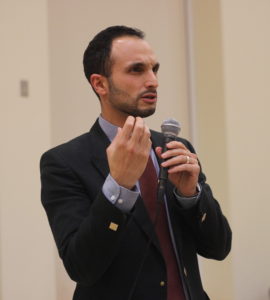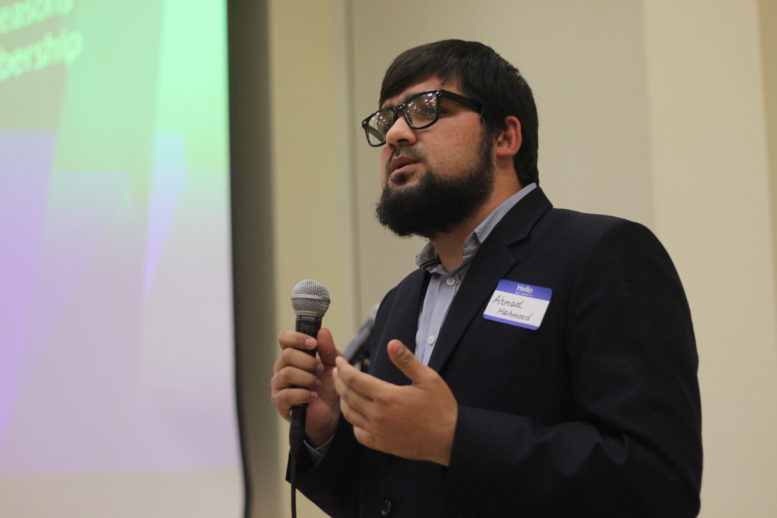By DAVID DUPONT
BG Independent News
Many people serve others because of the dictates of their religions. For Adam Smidi, it was his desire to serve others that led him to rededicate himself to Islam. As he read the Koran and about the prophet Mohammad, he found a calling.

Adam Smidi
At the recent Muslim Student Association Convention at Bowling Green State University, Smidi said: “I wanted to learn more about my religion that I was so far away from. I found that there was this element of social justice, like a pillar, or a backbone of the religion … treating yourself with dignity and treating others with the dignity that everyone deserves.”
The Muslim Student Association has dedicated this year to reaching out to the community through service, Toghrul Alakbarov, president of the group, said. They will collaborate with others including plans to participate in the Martin Luther King Jr. Day of Service next year. The convention is attended both by members of the association and community members invited for a free dinner, conversation, and entertaining lessons about Islam as well as presentations on weighty matters.
Smidi, now a doctoral student in organizational communication at BGSU, was born in West Virginia, making him a self-described “Muslim hillbilly” and grew up in Toledo.
His family, though, frequently traveled back to Lebanon to visit. He was “growing up with two cultures, two identities, and loving them both, my American and Muslim identities.”
He now runs his family’s car dealership.
“What’s most important to me is community service,” he said. He’s pursuing his doctorate to learn how to bring organizations together to help others.
The yearning for justice is universal, a tenet of all faiths, he said. “Inherently we feel the need to be just.”
He was drawn to it at first because of injustices to those who shared his faith, but that “opened my eyes to all the other injustice happening today.”
While a handful control half the world’s wealth, many others go hungry. “We don’t have to look globally, we can check out in our own backyard,” Smidi said.
One in five residents of Northwest Ohio have problems putting food on the table, and 35 percent of those are children under 18, he said.
One of the first commandments by the Prophet Mohammed was to feed the poor. “A moment of justice is better than a year of worship,” Smidi said.
But this service “is not something that will have an end game,” he said. “It’s a lifelong journey. It’s a life style. Don’t expect to see results immediately. … If your intentions are true, you will find peace.”
The second speaker Ahmad Mehmood turned his gaze globally, to a world with 65 million refugees. “Every minute in the world 24 people flee for their lives, 24 people leave behind everything they love and cherish in their lives.”
He said they flee persecution, war, and violence. To flee when your life and the lives of your loved ones are in danger is a human instinct, he said. And these people are part of the human community.
So far fewer than 200,000 of those refugees have actually been resettled, he said.
“How do we react when fellow humans are facing a cataclysmic event? … Do we open our arms, or do we turn our faces and backs on them?”
The response of many, Mehmood said, is “I have to take care of my own problems.” They ask: “What can I do?”
Mehmood said that there is no one answer. “You have to answer this question for yourself. How do you see yourself in this world?”
He pointed to the example of Oskar Schindler who saved more than a 1,000 Jews during the Holocaust. If he could do that in Nazi Germany, certainly people living in America can act. Even a few dollars donated to UNICEF can make a difference.
“It is not something they need,” Mehmood said, “but something you need to become a better human being.”

